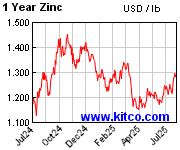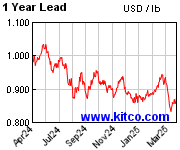Perú habría anotado crecimiento de dos dígitos 2do trim:ministra
lunes 12 de julio de 2010 15:13 GYT
Imprimir[-] Texto [+] LIMA (Reuters) - La economía de Perú habría crecido a una tasa de dos dígitos en el segundo trimestre frente al mismo período del año pasado, dijo el lunes la ministra de Economía, Mercedes Aráoz.
La nación sudamericana ha registrado arrolladoras cifras de crecimiento en los últimos meses, ante lo cual el Gobierno ha puesto en marcha medidas para frenar el ritmo del gasto público y evitar así un sobrecalentamiento de la economía.
Al ser consultada por periodistas sobre si la economía local habría crecido a tasas de dos dígitos entre abril y junio, la ministra respondió: "puede ser, el resultado del año pasado fue muy malo (...) tuvimos retrocesos en crecimiento y comercio".
Sin embargo, la ministra se abstuvo de precisar una cifra.
El Producto Interno Bruto (PIB) de Perú se expandió un 6 por ciento interanual en el primer trimestre, aunque en términos desestacionalizados creció un 1,3 por ciento contra el trimestre previo.
Pese a las sólidas cifras económicas de los últimos meses, Aráoz agregó que el Gobierno mantiene su previsión de un crecimiento del PIB de un 5,5 por ciento para este año.
La economía del país andino se expandió apenas un 0,9 por ciento el año pasado, tras haber crecido casi un 10 por ciento en el 2008, debido a que la crisis financiera mundial golpeó la demanda interna y los precios de sus vitales exportaciones mineras.
Según estimaciones de organismos internacionales, como el Fondo Monetario Internacional (FMI), Perú sería -junto a Brasil- la economía que más crecería en la región este año.
Martes 13/07/10 Alcoa reporto mejores utilidades
Re: Martes 13/07/10 Alcoa reporto mejores utilidades
Se espera que el crecimiento de Singapore sea mas del 20%
- admin
- Site Admin
- Mensajes: 165573
- Registrado: Mié Abr 21, 2010 9:02 pm
Re: Martes 13/07/10 Alcoa reporto mejores utilidades
C ya esta en 4.11 en anticipacion a sus resultados del segundo trimestre.
- admin
- Site Admin
- Mensajes: 165573
- Registrado: Mié Abr 21, 2010 9:02 pm
Re: Martes 13/07/10 Alcoa reporto mejores utilidades
Lo que le sucedera a Gerdau no tiene correlación con lo que le pudiera suceder a Sider. Ya varias veces ha sucedido que no se ha cumplido la lógica lastimosamente.
- Victor VE
- Mensajes: 2987
- Registrado: Jue Abr 22, 2010 8:33 am
Re: Martes 13/07/10 Alcoa reporto mejores utilidades
Bank of America maquilló sus cuentas para ocultar pérdidas de 10.700 millones
Bank of America ha anunciado a los reguladores federales que maquilló sus cuentas en los últimos tres años. Desde 2007 hasta 2009, la entidad hizo seis operaciones de deuda que le han hecho perder 10.700 millones de dólares y que en un principio fueron contabilizadas como inversión.
Bank of America envió en abril una carta al supervisor del mercado americano, SEC ( por sus siglas en inglés –Securities and Exchange Commission), en las que reconocía haber perdido 10.700 millones de dólares en unas operaciones contabilizadas de forma incorrecta, según ha publicado este fin de semana The Wall Street Journal en su edición online.
El banco ha reconocido que este error se materializó en sus cuentas del cuarto trimestre de 2007, 2008 y 2009 fueron incorrectas. Lo que hizo Bank of America se conoce en el mundo financiero como “negocios repo” y es un truco muy generalizado
Los bancos invierten el dinero en deuda a largo plazo, pero para tener liquidez toman créditos a corto que son respaldados con esa deuda a largo. En vez de registrarlo en sus cuentas como deuda, lo apuntan como una inversión. Así, en sus cuentas aparece que tienen una salud envidiable dadas sus inversiones, cuando en realidad lo que hay es deuda.
Lehman Brothers realizó ese tipo de operaciones hasta que sufrió un colapso en 2008. Éste especuló con titulizaciones hipotecarias de clientes sin poder económico que fueren ocultadas en sus cuentas y que llevaron al gobierno de EE UU a inyectar 45.000 millones de dólares.
Fuente: http://www.invertia.com/noticias/notici ... ia=2372962
Bank of America ha anunciado a los reguladores federales que maquilló sus cuentas en los últimos tres años. Desde 2007 hasta 2009, la entidad hizo seis operaciones de deuda que le han hecho perder 10.700 millones de dólares y que en un principio fueron contabilizadas como inversión.
Bank of America envió en abril una carta al supervisor del mercado americano, SEC ( por sus siglas en inglés –Securities and Exchange Commission), en las que reconocía haber perdido 10.700 millones de dólares en unas operaciones contabilizadas de forma incorrecta, según ha publicado este fin de semana The Wall Street Journal en su edición online.
El banco ha reconocido que este error se materializó en sus cuentas del cuarto trimestre de 2007, 2008 y 2009 fueron incorrectas. Lo que hizo Bank of America se conoce en el mundo financiero como “negocios repo” y es un truco muy generalizado
Los bancos invierten el dinero en deuda a largo plazo, pero para tener liquidez toman créditos a corto que son respaldados con esa deuda a largo. En vez de registrarlo en sus cuentas como deuda, lo apuntan como una inversión. Así, en sus cuentas aparece que tienen una salud envidiable dadas sus inversiones, cuando en realidad lo que hay es deuda.
Lehman Brothers realizó ese tipo de operaciones hasta que sufrió un colapso en 2008. Éste especuló con titulizaciones hipotecarias de clientes sin poder económico que fueren ocultadas en sus cuentas y que llevaron al gobierno de EE UU a inyectar 45.000 millones de dólares.
Fuente: http://www.invertia.com/noticias/notici ... ia=2372962
- Victor VE
- Mensajes: 2987
- Registrado: Jue Abr 22, 2010 8:33 am
Re: Martes 13/07/10 Alcoa reporto mejores utilidades
No hay nada bueno bajo un sistema socialista, absolutamente nada.
Dr. Berdwick y El Fabulosos Sistema de Salud de Cuba. La marcha muerta de la medicina progresiva
A nadie se le ocurra acusar al Donal Berwick del Centro de Medicare y Medicaid con $800 billones a su cargo de ser un admirador del seguro de salud de Cuba.
En este periodico no asustamos a nadie. Y hay pruebas de que el Dr. Berwick es un admirador del servicio de salud Cubano.
Hay que notar que cuando se paso el seguro de salud de Obama, Fidel dijo que era un milagro. Notar tambien que el Dr. Berdwick se ha hecho notorio por acusar al servicio privado de una empresa oscura. Ha admitido su amor por el sistema socializado de medicina de Inglaterra e insiste que un excelente cuidado de salud tiene forzosamente que ser un sistema de redistribucion.
Creemos que en este momento vale la pena revisar el sistema de salud Cubano como lo ha hecho Laurie Garett a senior gellow del Council on Foreign Relatios en la ultima edicion del magazine Foreign Affairs.
El problema del sistema Cubano es que esta al borde del colapso. El sector salud en Cuba ha quebrado al estado y ha llevado a los medicos a abandonar la medicina y el pais. Es ostensiblemente igualdad de naturaleza es radicalemente una realidad desigual con un pequenio numero de clinicas en buen estado que atienden a torustas y a los del partido comunista mientras el pueblo Cubano se atienden en inmundos hospitales sin recursos.
Consideren los hechos expresado por Ms. Garret. Hay 73,000 medicos con licensia para practicar en Cuba. Esto permite a Cuba decir que tiene la mayor cantidad de medicos por paciente en el mundo, con un doctor por cada 170 personas muy por debajo de un medico para 390 personas en US.
Y sin embargo la realidad le gana a las estadisticas. Mas de la mitad de los medicos Cubanos trabajan fuera de la Isla, pagan 66% de impuestos, muchos de ellos se van del pais. Los doctores que se quedan ganan mas o menos $25 al mes. Como resultado, Ms Garrett escribe, ellos con frecuencia toman trabajos como taxistas o trabajan en hoteles donde pueden ganar mas dinero. Y si se va a hablar de la calidad de los doctores que algunos de los pocos que logran venir a US solo pueden trabajar como enfermeros, debido al lenguaje y a las contrastantes diferencias con el entrenamiento y educacion medica.
Y de la realidad del tratamiento medico en Cuba, Ms. Garrett reporta que los pacientes en los hospitales Cubanos deben llegar al hospital con sus propias jeringas, tohallas y sabanas para sus camas. Las mujeres evitan los examenes ginecologicos por temor a la infeccion que puede causarles la falta de limpieza en el equipo de los hospitales. El cancer al utero se ha duplicado en los ultimos 25 anios por que usan el examen Pap que ha fallado en un 30%.
Y para lso admiradores del sistema Cubano que publicitan la baja mortalidad de los ninios, lo que no se sabe es que la mayoria de las muertes ocurren durante el parto o las 48 horas despues del parto debido a la hemorragia uterina o al postparto.
Suena invitador? el anio pasado Margaret Chan, el director general de la organizacion Mundial de la Salud, dijo que Cuba tenia la correcta vision y la correcta direccion. La salud y la politica del estado es vista como un derecho de la gente. En el 2005 un editorialista del NY Times escribio una columna donde decia que si se trataba de salud habia que preguntarle a Cuba. Probablemente a eso se referia Collin Powel cuando dijo que Castro habia hecho algunas cosas buenas por su gente. De verdad?
La verdad es que el socialismo y sus formas relacionadas de comando y control de la tecnocracia trabaja tan bien en el sector salul como en cualquier otro. Lo cual es decir nada. Cuando los Americanos se vayan a otros paises a atenderse por medicos Americanos que se hayan ido del pais, mientras los pobres de US se atiendan en US, talvez la realidad del sistema de salud de Obama se entienda en US y las verdaderas lecciones del sistema Cubano sean aprendidas en US. Talvez tambien seran apreciadas por los amigos del Dr. Berwick.
Dr. Berwick and That Fabulous Cuban Health Care
The death march of progressive medicine.
By BRET STEPHENS
Heaven forbid that anyone accuse Donald Berwick—lately of Harvard, newly of the Centers for Medicare and Medicaid Services, with $800 billion under management—of being an admirer of Cuba's health-care system. In the matter of CastroCare, progressives of Dr. Berwick's stripe are rarely at a loss for superlatives. But suggest that ObamaCare is a step in the Cuban direction, and these same people will accuse you of rank scare-mongering.
We don't scare-monger in this paper. And for the record, nothing in Dr. Berwick's published record indicates he has ever praised the Cuban system.
But note that when the health-care bill became law in March, Fidel Castro emerged from semiretirement to praise it as a "miracle." Note also that Dr. Berwick has made himself notorious by warning of "the darkness of private enterprise," admitting his "love" for Britain's socialized National Health Service, and insisting that "excellent health care is by definition redistributional."
View Full Image
Reuters
A patient waits to be examined at the Ramon Pando Ferrer ophthalmology hospital in Havana.
.Without imputing a mutuality of views, then, it's worth noting a certain mutuality of respect. So it's a good time to check in on the state of the Cuban health-care system. That's just what Laurie Garrett, a senior fellow at the Council on Foreign Relations, does in the current issue of Foreign Affairs magazine.
Lest anyone mistake Ms. Garrett as a raving opponent of the Cuban system, she praises Cuba for offering "an inspiring, standard-setting vision of government responsibility for the health of its people." Cuba's (reported) success in reducing the incidence of child mortality and tropical diseases, she adds, is "laudable."
Just one problem: The system is in an advanced state of collapse. It is bankrupting the state and driving doctors out of the medical field and the country. Its ostensibly egalitarian nature disguises a radically inegalitarian reality, with a tiny number of well-appointed clinics catering to paying medical tourists and senior Party apparatchiks while most Cubans take their chances in filthy, under-resourced hospitals.
Consider the facts as laid out by Ms. Garrett. There are 73,000 physicians licensed to practice in Cuba. This allows Cuba to boast of having the best doctor-patient ratio in the world, with one doctor for every 170 people, as opposed to one for every 390 in the United States.
Yet reality belies the statistics. Slightly more than half of all Cuban physicians work overseas; taxed by the Cuban state at a 66% rate, many of them wind up defecting. Doctors who remain in the country earn about $25 a month. As a result, Ms. Garrett writes, they often take "jobs as taxi drivers or in hotels," where they can make better money. As for the quality of the doctors, she notes that very few of those who manage to reach the U.S. can gain accreditation here, partly because of the language barrier, partly because of the "stark differences" in medical training. Typically, they wind up working as nurses.
As for the quality of medical treatment in Cuba, Ms. Garrett reports that hospital patients must arrive with their own syringes, towels and bed sheets. Women avoid gynecological exams "because they fear infection from unhygienic equipment and practices." Rates of cervical cancer have doubled in the past 25 years as the use of Pap tests has fallen by 30%.
And while Cuba's admirers love to advertise the country's low infant mortality rate (at least according to the Castro regime's dubious self-reporting) the flip-side has been a high rate of maternal mortality. "Most deaths," Ms. Garrett writes, "occur during delivery or within the next 48 hours and are caused by uterine hemorrhage or postpartum sepsis."
Sound inviting? The number of ostensibly serious people—Michael Moore not being one of them—who think so is nothing short of astonishing. On a visit to Cuba last October, Margaret Chan, the director general of the World Health Organization, said that Cuba "has the right vision and the right direction. Health is a state policy and state is seen as a right of the people." In 2005, one prominent New York Times editorialist headlined a column "Health Care? Ask Cuba." Health care was probably also what former Secretary of State Colin Powell had in mind when he noted that "Castro has done some good things for his people."
Now, to repeat, Dr. Berwick is nowhere on record endorsing Cuban-style health care. And ObamaCare, with its million flaws, is not CastroCare.
But it remains the case that for all those for whom "free" health care has been, as Teddy Kennedy once put it, the cause of their lives, the Cuban system has been a touchstone—proof, supposedly, that socialized medicine is, as Dr. Berwick has said, the only "just, equitable, civilized and humane" answer when it comes to addressing the dilemmas inherent in health-care delivery.
The truth is that socialism and related forms of command-and-control technocracy work as well in the health-care market as they do in every other. Which is to say, not at all. When better-heeled Americans start flying to offshore medical centers for their facelifts and bypasses (performed by expat American doctors) while poorer folk make do in ObamaCare's second tier, then perhaps the real lessons of the Cuban system will begin to sink in. Even, perhaps, among Dr. Berwick's progressive friends.
Dr. Berdwick y El Fabulosos Sistema de Salud de Cuba. La marcha muerta de la medicina progresiva
A nadie se le ocurra acusar al Donal Berwick del Centro de Medicare y Medicaid con $800 billones a su cargo de ser un admirador del seguro de salud de Cuba.
En este periodico no asustamos a nadie. Y hay pruebas de que el Dr. Berwick es un admirador del servicio de salud Cubano.
Hay que notar que cuando se paso el seguro de salud de Obama, Fidel dijo que era un milagro. Notar tambien que el Dr. Berdwick se ha hecho notorio por acusar al servicio privado de una empresa oscura. Ha admitido su amor por el sistema socializado de medicina de Inglaterra e insiste que un excelente cuidado de salud tiene forzosamente que ser un sistema de redistribucion.
Creemos que en este momento vale la pena revisar el sistema de salud Cubano como lo ha hecho Laurie Garett a senior gellow del Council on Foreign Relatios en la ultima edicion del magazine Foreign Affairs.
El problema del sistema Cubano es que esta al borde del colapso. El sector salud en Cuba ha quebrado al estado y ha llevado a los medicos a abandonar la medicina y el pais. Es ostensiblemente igualdad de naturaleza es radicalemente una realidad desigual con un pequenio numero de clinicas en buen estado que atienden a torustas y a los del partido comunista mientras el pueblo Cubano se atienden en inmundos hospitales sin recursos.
Consideren los hechos expresado por Ms. Garret. Hay 73,000 medicos con licensia para practicar en Cuba. Esto permite a Cuba decir que tiene la mayor cantidad de medicos por paciente en el mundo, con un doctor por cada 170 personas muy por debajo de un medico para 390 personas en US.
Y sin embargo la realidad le gana a las estadisticas. Mas de la mitad de los medicos Cubanos trabajan fuera de la Isla, pagan 66% de impuestos, muchos de ellos se van del pais. Los doctores que se quedan ganan mas o menos $25 al mes. Como resultado, Ms Garrett escribe, ellos con frecuencia toman trabajos como taxistas o trabajan en hoteles donde pueden ganar mas dinero. Y si se va a hablar de la calidad de los doctores que algunos de los pocos que logran venir a US solo pueden trabajar como enfermeros, debido al lenguaje y a las contrastantes diferencias con el entrenamiento y educacion medica.
Y de la realidad del tratamiento medico en Cuba, Ms. Garrett reporta que los pacientes en los hospitales Cubanos deben llegar al hospital con sus propias jeringas, tohallas y sabanas para sus camas. Las mujeres evitan los examenes ginecologicos por temor a la infeccion que puede causarles la falta de limpieza en el equipo de los hospitales. El cancer al utero se ha duplicado en los ultimos 25 anios por que usan el examen Pap que ha fallado en un 30%.
Y para lso admiradores del sistema Cubano que publicitan la baja mortalidad de los ninios, lo que no se sabe es que la mayoria de las muertes ocurren durante el parto o las 48 horas despues del parto debido a la hemorragia uterina o al postparto.
Suena invitador? el anio pasado Margaret Chan, el director general de la organizacion Mundial de la Salud, dijo que Cuba tenia la correcta vision y la correcta direccion. La salud y la politica del estado es vista como un derecho de la gente. En el 2005 un editorialista del NY Times escribio una columna donde decia que si se trataba de salud habia que preguntarle a Cuba. Probablemente a eso se referia Collin Powel cuando dijo que Castro habia hecho algunas cosas buenas por su gente. De verdad?
La verdad es que el socialismo y sus formas relacionadas de comando y control de la tecnocracia trabaja tan bien en el sector salul como en cualquier otro. Lo cual es decir nada. Cuando los Americanos se vayan a otros paises a atenderse por medicos Americanos que se hayan ido del pais, mientras los pobres de US se atiendan en US, talvez la realidad del sistema de salud de Obama se entienda en US y las verdaderas lecciones del sistema Cubano sean aprendidas en US. Talvez tambien seran apreciadas por los amigos del Dr. Berwick.
Dr. Berwick and That Fabulous Cuban Health Care
The death march of progressive medicine.
By BRET STEPHENS
Heaven forbid that anyone accuse Donald Berwick—lately of Harvard, newly of the Centers for Medicare and Medicaid Services, with $800 billion under management—of being an admirer of Cuba's health-care system. In the matter of CastroCare, progressives of Dr. Berwick's stripe are rarely at a loss for superlatives. But suggest that ObamaCare is a step in the Cuban direction, and these same people will accuse you of rank scare-mongering.
We don't scare-monger in this paper. And for the record, nothing in Dr. Berwick's published record indicates he has ever praised the Cuban system.
But note that when the health-care bill became law in March, Fidel Castro emerged from semiretirement to praise it as a "miracle." Note also that Dr. Berwick has made himself notorious by warning of "the darkness of private enterprise," admitting his "love" for Britain's socialized National Health Service, and insisting that "excellent health care is by definition redistributional."
View Full Image
Reuters
A patient waits to be examined at the Ramon Pando Ferrer ophthalmology hospital in Havana.
.Without imputing a mutuality of views, then, it's worth noting a certain mutuality of respect. So it's a good time to check in on the state of the Cuban health-care system. That's just what Laurie Garrett, a senior fellow at the Council on Foreign Relations, does in the current issue of Foreign Affairs magazine.
Lest anyone mistake Ms. Garrett as a raving opponent of the Cuban system, she praises Cuba for offering "an inspiring, standard-setting vision of government responsibility for the health of its people." Cuba's (reported) success in reducing the incidence of child mortality and tropical diseases, she adds, is "laudable."
Just one problem: The system is in an advanced state of collapse. It is bankrupting the state and driving doctors out of the medical field and the country. Its ostensibly egalitarian nature disguises a radically inegalitarian reality, with a tiny number of well-appointed clinics catering to paying medical tourists and senior Party apparatchiks while most Cubans take their chances in filthy, under-resourced hospitals.
Consider the facts as laid out by Ms. Garrett. There are 73,000 physicians licensed to practice in Cuba. This allows Cuba to boast of having the best doctor-patient ratio in the world, with one doctor for every 170 people, as opposed to one for every 390 in the United States.
Yet reality belies the statistics. Slightly more than half of all Cuban physicians work overseas; taxed by the Cuban state at a 66% rate, many of them wind up defecting. Doctors who remain in the country earn about $25 a month. As a result, Ms. Garrett writes, they often take "jobs as taxi drivers or in hotels," where they can make better money. As for the quality of the doctors, she notes that very few of those who manage to reach the U.S. can gain accreditation here, partly because of the language barrier, partly because of the "stark differences" in medical training. Typically, they wind up working as nurses.
As for the quality of medical treatment in Cuba, Ms. Garrett reports that hospital patients must arrive with their own syringes, towels and bed sheets. Women avoid gynecological exams "because they fear infection from unhygienic equipment and practices." Rates of cervical cancer have doubled in the past 25 years as the use of Pap tests has fallen by 30%.
And while Cuba's admirers love to advertise the country's low infant mortality rate (at least according to the Castro regime's dubious self-reporting) the flip-side has been a high rate of maternal mortality. "Most deaths," Ms. Garrett writes, "occur during delivery or within the next 48 hours and are caused by uterine hemorrhage or postpartum sepsis."
Sound inviting? The number of ostensibly serious people—Michael Moore not being one of them—who think so is nothing short of astonishing. On a visit to Cuba last October, Margaret Chan, the director general of the World Health Organization, said that Cuba "has the right vision and the right direction. Health is a state policy and state is seen as a right of the people." In 2005, one prominent New York Times editorialist headlined a column "Health Care? Ask Cuba." Health care was probably also what former Secretary of State Colin Powell had in mind when he noted that "Castro has done some good things for his people."
Now, to repeat, Dr. Berwick is nowhere on record endorsing Cuban-style health care. And ObamaCare, with its million flaws, is not CastroCare.
But it remains the case that for all those for whom "free" health care has been, as Teddy Kennedy once put it, the cause of their lives, the Cuban system has been a touchstone—proof, supposedly, that socialized medicine is, as Dr. Berwick has said, the only "just, equitable, civilized and humane" answer when it comes to addressing the dilemmas inherent in health-care delivery.
The truth is that socialism and related forms of command-and-control technocracy work as well in the health-care market as they do in every other. Which is to say, not at all. When better-heeled Americans start flying to offshore medical centers for their facelifts and bypasses (performed by expat American doctors) while poorer folk make do in ObamaCare's second tier, then perhaps the real lessons of the Cuban system will begin to sink in. Even, perhaps, among Dr. Berwick's progressive friends.
- admin
- Site Admin
- Mensajes: 165573
- Registrado: Mié Abr 21, 2010 9:02 pm
Re: Martes 13/07/10 Alcoa reporto mejores utilidades
Gracias Obama!!
El gasto del gobierno en US ha sido durante los ultimos 50 anios el 20.3% del PBI (GDP) Usando la bace del deficit de $13 trillones para la proxima decada, el CBO estima que subira a 26.5% para el 2020 y seguira subiendo aun mas despues de ese anio.
Poniendo todo junto, el deficit del presupuesto, el cual ha sido historicamente el 2.3% del GDP (PBI) aumentara al 8.3% para el 2020 bajo las nuevas politicas de Obama. Esto resultara en un cobro de impuestos mayor en 0.2% a lo hecho historicamente pero el gasto sera 6.2% mas alto que su promedio historico.
Spending—which has averaged 20.3% of GDP over the past 50 years—won't remain as stable. Using the budget baseline deficit of $13 trillion for the next decade as described above, CBO figures show spending surging to a peacetime record 26.5% of GDP by 2020 and also rising steeply thereafter.
Putting this together, the budget deficit, historically 2.3% of GDP, is projected to leap to 8.3% of GDP by 2020 under current policies. This will result from Washington taxing at 0.2% of GDP above the historical average but spending 6.2% above its historical average.
El gasto del gobierno en US ha sido durante los ultimos 50 anios el 20.3% del PBI (GDP) Usando la bace del deficit de $13 trillones para la proxima decada, el CBO estima que subira a 26.5% para el 2020 y seguira subiendo aun mas despues de ese anio.
Poniendo todo junto, el deficit del presupuesto, el cual ha sido historicamente el 2.3% del GDP (PBI) aumentara al 8.3% para el 2020 bajo las nuevas politicas de Obama. Esto resultara en un cobro de impuestos mayor en 0.2% a lo hecho historicamente pero el gasto sera 6.2% mas alto que su promedio historico.
Spending—which has averaged 20.3% of GDP over the past 50 years—won't remain as stable. Using the budget baseline deficit of $13 trillion for the next decade as described above, CBO figures show spending surging to a peacetime record 26.5% of GDP by 2020 and also rising steeply thereafter.
Putting this together, the budget deficit, historically 2.3% of GDP, is projected to leap to 8.3% of GDP by 2020 under current policies. This will result from Washington taxing at 0.2% of GDP above the historical average but spending 6.2% above its historical average.
- admin
- Site Admin
- Mensajes: 165573
- Registrado: Mié Abr 21, 2010 9:02 pm
Re: Martes 13/07/10 Alcoa reporto mejores utilidades
Los graficos del dia, 
.




.




.




.



.



.
.




.




.




.



.



.
- Comodoro
- Mensajes: 980
- Registrado: Jue May 06, 2010 8:24 am
- Ubicación: LIMA
Re: Martes 13/07/10 Alcoa reporto mejores utilidades
MIRL agrega otro proyecto de exploración a su cartera de áreas con potencial aurífero. Tener en cuenta que la zona referida ha sido explotada anteriormente por mineros informales (mal llamados "artesanos").
Minera IRL Announces Acquisition Option on the Killincho Gold Project in Southern Peru
London, 13 July 2010: Minera IRL Limited ("Minera IRL" or the "Company"), (TSX:IRL) (AIM:MIRL) (BVL:MIRL) the Latin American focused gold mining, development and exploration company, announces it has entered into option agreements (the "Agreements") to purchase the Killincho Gold Exploration Project from Ingerieria y Tecnologia Minero-Metalurgica SA ("ITMM").
Highlights:
· The Agreements consolidates eight properties, totalling 3,317ha, into one high quality gold exploration project in southern Peru
· Killincho is located within the same gold-bearing Sandia geological formation which hosts Minera IRL's 1.3m oz Ollachea Project (inferred resource)
· Field reconnaissance and surface sampling commenced
· History of local artisanal gold production
"The addition of Killincho to Minera IRL's inventory of exploration projects is a further step toward consolidation of a highly prospective land position associated within the gold-bearing Sandia formation in southern Peru." said Courtney Chamberlain, Executive Chairman of Minera IRL. "This is the same slate belt formation which hosts our flagship one-million-plus ounce resource at Ollachea 150 kilometres north west of Killincho. The Sandia Formation is emerging as a major new district which hosts a number of impressive gold deposits including Untuca, La Rinconada, Winchomayo and Santa Domingo."
Following field evaluations and negotiations spanning more than 12 months, on 12 July 2010 Minera IRL SA, a subsidiary of Minera IRL Limited, signed agreements with Ingerieria y Tecnologia Minero-Metalurgica SA ("ITMM") to purchase 8 properties. The acquisition consolidates a strategic position, known as the Killincho Gold Project in southern Peru.
The Agreements includes progressive staged payments to ITMM, who have underlying agreements with two property owners, which will allow for progressive exploration funded by Minera IRL. In the event that exploration is not successful, the Company can terminate the Agreements without obligation at any time in the future. In addition, ITMM has been granted an exploration license in its own right, which constitutes the third property component of the transaction, over an adjoining block with geologically prospective, and apparently contiguous, exploration features.
Three principal gold mineralization styles have been recognized to date. These include gold mineralization in breccia and/or shear zones, intrusive sedimentary rock contacts and quartz veins that are being selectively mined by artisanal miners on a modest, but high grade basis.
Exploration activities have commenced.
Minera IRL Announces Acquisition Option on the Killincho Gold Project in Southern Peru
London, 13 July 2010: Minera IRL Limited ("Minera IRL" or the "Company"), (TSX:IRL) (AIM:MIRL) (BVL:MIRL) the Latin American focused gold mining, development and exploration company, announces it has entered into option agreements (the "Agreements") to purchase the Killincho Gold Exploration Project from Ingerieria y Tecnologia Minero-Metalurgica SA ("ITMM").
Highlights:
· The Agreements consolidates eight properties, totalling 3,317ha, into one high quality gold exploration project in southern Peru
· Killincho is located within the same gold-bearing Sandia geological formation which hosts Minera IRL's 1.3m oz Ollachea Project (inferred resource)
· Field reconnaissance and surface sampling commenced
· History of local artisanal gold production
"The addition of Killincho to Minera IRL's inventory of exploration projects is a further step toward consolidation of a highly prospective land position associated within the gold-bearing Sandia formation in southern Peru." said Courtney Chamberlain, Executive Chairman of Minera IRL. "This is the same slate belt formation which hosts our flagship one-million-plus ounce resource at Ollachea 150 kilometres north west of Killincho. The Sandia Formation is emerging as a major new district which hosts a number of impressive gold deposits including Untuca, La Rinconada, Winchomayo and Santa Domingo."
Following field evaluations and negotiations spanning more than 12 months, on 12 July 2010 Minera IRL SA, a subsidiary of Minera IRL Limited, signed agreements with Ingerieria y Tecnologia Minero-Metalurgica SA ("ITMM") to purchase 8 properties. The acquisition consolidates a strategic position, known as the Killincho Gold Project in southern Peru.
The Agreements includes progressive staged payments to ITMM, who have underlying agreements with two property owners, which will allow for progressive exploration funded by Minera IRL. In the event that exploration is not successful, the Company can terminate the Agreements without obligation at any time in the future. In addition, ITMM has been granted an exploration license in its own right, which constitutes the third property component of the transaction, over an adjoining block with geologically prospective, and apparently contiguous, exploration features.
Three principal gold mineralization styles have been recognized to date. These include gold mineralization in breccia and/or shear zones, intrusive sedimentary rock contacts and quartz veins that are being selectively mined by artisanal miners on a modest, but high grade basis.
Exploration activities have commenced.
- Maricielo
- Mensajes: 412
- Registrado: Dom Jul 04, 2010 8:45 pm
Re: Martes 13/07/10 Alcoa reporto mejores utilidades
Moody's le da un downgraded a la deuda de Portugal en dos categorias a A1 con un outlook de estable.
La Internacional Oil Agency dice que la demanda de petroleo desacelerara el proximo anio debido a la menor demanda por parte de China y el resto del mundo en general.
La demanda crecera 1.6% o 1.3 millones de barriles diarios en lugar de 2.3% de crecimiento estimado anteriormente.
Las expectativas economicas en Alemania bajaron a 21.2 es el tercer mes consecutivo a la baja.
Debido a la caida de bienes raices en Florida, la banca de ese estado esta pidiendo ayuda al gobierno.
China renovo sus promesas de no relajar la politica monetaria en ese pais para evitar que las propiedades sigan subiendo. El Asia cerro a la baja.
Grecia vendio mas deuda sin ningun problema.
La Internacional Oil Agency dice que la demanda de petroleo desacelerara el proximo anio debido a la menor demanda por parte de China y el resto del mundo en general.
La demanda crecera 1.6% o 1.3 millones de barriles diarios en lugar de 2.3% de crecimiento estimado anteriormente.
Las expectativas economicas en Alemania bajaron a 21.2 es el tercer mes consecutivo a la baja.
Debido a la caida de bienes raices en Florida, la banca de ese estado esta pidiendo ayuda al gobierno.
China renovo sus promesas de no relajar la politica monetaria en ese pais para evitar que las propiedades sigan subiendo. El Asia cerro a la baja.
Grecia vendio mas deuda sin ningun problema.
- admin
- Site Admin
- Mensajes: 165573
- Registrado: Mié Abr 21, 2010 9:02 pm
Re: Martes 13/07/10 Alcoa reporto mejores utilidades
Europa al alza a pesar de lo de Portugal,
Oil up 75.39
Los futures del Dow Jones 48 puntos al alza.
Yields up 3.06%
Au up 1,206, futures cu down 2.99965
Euro down 1.2581
Libor igual 0.53%
Oil up 75.39
Los futures del Dow Jones 48 puntos al alza.
Yields up 3.06%
Au up 1,206, futures cu down 2.99965
Euro down 1.2581
Libor igual 0.53%
- admin
- Site Admin
- Mensajes: 165573
- Registrado: Mié Abr 21, 2010 9:02 pm
Re: Martes 13/07/10 Alcoa reporto mejores utilidades
Copper July 13,07:19
Bid/Ask 2.9855 - 2.9900
Change -0.0136 -0.45%
Low/High 2.9583 - 3.0218
Charts
Nickel July 13,07:15
Bid/Ask 8.7241 - 8.7695
Change +0.0862 +1.00%
Low/High 8.5381 - 8.8103
Charts
Aluminum July 13,07:08
Bid/Ask 0.8664 - 0.8710
Change -0.0041 -0.47%
Low/High 0.8592 - 0.8773
Charts
Zinc July 13,07:18
Bid/Ask 0.8203 - 0.8249
Change -0.0064 -0.77%
Low/High 0.8063 - 0.8357
Charts
Lead July 13,07:18
Bid/Ask 0.8006 - 0.8051
Change +0.0000 +0.00%
Low/High 0.7870 - 0.8097
Bid/Ask 2.9855 - 2.9900
Change -0.0136 -0.45%
Low/High 2.9583 - 3.0218
Charts
Nickel July 13,07:15
Bid/Ask 8.7241 - 8.7695
Change +0.0862 +1.00%
Low/High 8.5381 - 8.8103
Charts
Aluminum July 13,07:08
Bid/Ask 0.8664 - 0.8710
Change -0.0041 -0.47%
Low/High 0.8592 - 0.8773
Charts
Zinc July 13,07:18
Bid/Ask 0.8203 - 0.8249
Change -0.0064 -0.77%
Low/High 0.8063 - 0.8357
Charts
Lead July 13,07:18
Bid/Ask 0.8006 - 0.8051
Change +0.0000 +0.00%
Low/High 0.7870 - 0.8097
- admin
- Site Admin
- Mensajes: 165573
- Registrado: Mié Abr 21, 2010 9:02 pm
Re: Martes 13/07/10 Alcoa reporto mejores utilidades
Los pequeños inversionistas de EE.UU. huyen de las acciones
Por E.S. Browning
Hace unos meses, muchos inversionistas comunes y corrientes regresaban de puntillas al mercado de acciones. Ahora, vuelven a salir corriendo en busca de un refugio.
Karen y Roger Potyk, una pareja jubilada sin problemas económicos de San Antonio, en el estado de Texas, se habían quedado con algunas acciones en fondos de inversión bursátiles a pesar de su ansiedad tras la crisis financiera de 2008. Pero el brote de volatilidad bursátil tras el flash crash del 6 de mayo resultó ser la gota que colmó el vaso.
"Simplemente, no queríamos soportarlo más", afirma Karen Potyk. La pareja se deshizo de sus últimas acciones el 20 de mayo y pasaron el dinero a bonos, certificados de depósito y anualidades.
La confianza de los pequeños inversionistas en las acciones, que subieron de forma notable en la década de 1990, empezó a colapsar a partir de la debacle de las acciones tecnológicas y los escándalos de Enron y WorldCom de 2000-2002. La crisis financiera de 2007-2009 sólo empeoró la situación. Ahora, la retirada de los inversionistas comunes y corrientes significa que son una fuerza en descenso en un mercado que está cada vez más dominado por profesionales.
Algunos se vieron tentados por los valores durante el súbito auge de 70% que arrancó en marzo de 2009 y duró hasta abril. Pero datos de fondos de inversión y otras pistas sugieren que ese breve romance terminó.
Desilusión generalizada
En 2002, los inversionistas retiraron más dinero de fondos mutuos que invierten en acciones estadounidenses que el que colocaron. Luego, entre 2007 y 2009, retiraron dinero durante tres años consecutivos. Eso marcó el primer período de tres años de retiros desde 1979-1981, según el Investment Company Institute (ICI por sus siglas en inglés), un grupo de la industria de fondos mutuos. Este año, los fondos de acciones estadounidenses recibieron entradas netas en enero, marzo y abril, pero los retiros se reanudaron en mayo.
Los inversionistas hablan de una desilusión creciente con las grandes instituciones, incluyendo empresas, gobiernos, bancos y partidos políticos, así como temores sobre la pesada deuda del país. La confianza de algunas personas en las acciones se vio seriamente golpeada por la incertidumbre que reapareció en mayo. Temen que el flash crash del 6 de mayo, cuando el Promedio Industrial Dow Jones cayó 700 puntos en ocho minutos antes de repuntar, es una señal de que los pequeños inversionistas están cada vez más a merced de empresas anónimas que realizan sus operaciones de corretaje con poderosas computadoras.
En los años 90, los inversionistas individuales eran importantes pilares del mercado financiero, pero su huida de las acciones está cambiando la dinámica. Al volcar dinero a los fondos mutuos, los pequeños inversionistas ayudaron a impulsar el precio de las acciones en los años 90 y en menor medida de 2003 a 2006. Ahora vuelven a sacar dinero, lo que los convierte en una carga para el mercado.
Los pequeños inversionistas vuelven a comportarse de acuerdo a la filosofía de cautela que desarrollaron durante la década de los 70. Ese fue el último período prolongado de debilidad bursátil, tras el cual a mucha gente le llevó diez años o más recuperar la confianza en las acciones.
"Me siento como la cola del perro, que es movida por los inversionistas institucionales que corren muchos riesgos, juegan muchos juegos y tienen estos pedidos informatizados que me afectan mucho", lamenta Simeon Thibeaux, un empresario semijubilado en Louisiana.
La historia sugiere que los inversionistas acabarán por volver a las acciones, como lo hicieron en la década de los 80 y, aún con más fuerza, en los 90. Pero reconstruir su fe podría llevar tiempo, afirma Brian Reid, economista jefe del ICI. En otras situaciones similares, fue necesario un período de éxito extendido para volver a atraer a los inversionistas.
"Hemos atravesado dos de los peores mercados bajistas desde la Gran Depresión y eso les ha dado a los inversionistas una mejor referencia de los riesgos y peligros de invertir" en acciones, asegura Reid, en referencia a los mercados pesimistas de 2000-2002 y 2007-2009.
La disipación gradual de la confianza de los inversionistas puede verse en los patrones de inversión de los fondos de inversión.
Luego de salir perdiendo tras el estallido de la burbuja tecnológica en 2000, los inversionistas regresaron a los fondos de acciones estadounidenses en 2003, cuando las acciones inauguraron un nuevo mercado alcista, según datos del ICI. Pero las compras resultaron ser tibias y se convirtieron en ventas netas en el último trecho de 2006, incluso antes de que concluyera el mercado alcista en 2007. A pesar de lapsos ocasionales de flujos que ingresaron a los fondos de acciones estadounidenses, la tendencia a la venta continúa desde entonces. Los inversionistas retiraron un neto de US$7.000 millones de los fondos de inversión en los siete días que terminaron el 12 de mayo y US$13.000 millones dos semanas después, lo que eclipsó los depósitos realizados en los meses previos.
Ahora que el portafolio de los Potyk consiste exclusivamente en inversiones de renta fija, "ya no ganaré 8% sobre mi dinero, sino 4% o 5%, pero el dinero seguirá ahí", dijo Roger Potyk.
"No creo que haya ninguna estrategia de inversión ahora excepto la de abrocharse el cinturón de seguridad y esperar que uno no salga golpeado demasiado fuerte", dice Thibeaux.
Algunos asesores de inversiones les están aconsejando a sus clientes que, para los inversionistas a largo plazo, estos meses venideros serán óptimos para comprar acciones baratas. Pero hasta ahora, no son muchos los clientes que les estén haciendo caso.
Por E.S. Browning
Hace unos meses, muchos inversionistas comunes y corrientes regresaban de puntillas al mercado de acciones. Ahora, vuelven a salir corriendo en busca de un refugio.
Karen y Roger Potyk, una pareja jubilada sin problemas económicos de San Antonio, en el estado de Texas, se habían quedado con algunas acciones en fondos de inversión bursátiles a pesar de su ansiedad tras la crisis financiera de 2008. Pero el brote de volatilidad bursátil tras el flash crash del 6 de mayo resultó ser la gota que colmó el vaso.
"Simplemente, no queríamos soportarlo más", afirma Karen Potyk. La pareja se deshizo de sus últimas acciones el 20 de mayo y pasaron el dinero a bonos, certificados de depósito y anualidades.
La confianza de los pequeños inversionistas en las acciones, que subieron de forma notable en la década de 1990, empezó a colapsar a partir de la debacle de las acciones tecnológicas y los escándalos de Enron y WorldCom de 2000-2002. La crisis financiera de 2007-2009 sólo empeoró la situación. Ahora, la retirada de los inversionistas comunes y corrientes significa que son una fuerza en descenso en un mercado que está cada vez más dominado por profesionales.
Algunos se vieron tentados por los valores durante el súbito auge de 70% que arrancó en marzo de 2009 y duró hasta abril. Pero datos de fondos de inversión y otras pistas sugieren que ese breve romance terminó.
Desilusión generalizada
En 2002, los inversionistas retiraron más dinero de fondos mutuos que invierten en acciones estadounidenses que el que colocaron. Luego, entre 2007 y 2009, retiraron dinero durante tres años consecutivos. Eso marcó el primer período de tres años de retiros desde 1979-1981, según el Investment Company Institute (ICI por sus siglas en inglés), un grupo de la industria de fondos mutuos. Este año, los fondos de acciones estadounidenses recibieron entradas netas en enero, marzo y abril, pero los retiros se reanudaron en mayo.
Los inversionistas hablan de una desilusión creciente con las grandes instituciones, incluyendo empresas, gobiernos, bancos y partidos políticos, así como temores sobre la pesada deuda del país. La confianza de algunas personas en las acciones se vio seriamente golpeada por la incertidumbre que reapareció en mayo. Temen que el flash crash del 6 de mayo, cuando el Promedio Industrial Dow Jones cayó 700 puntos en ocho minutos antes de repuntar, es una señal de que los pequeños inversionistas están cada vez más a merced de empresas anónimas que realizan sus operaciones de corretaje con poderosas computadoras.
En los años 90, los inversionistas individuales eran importantes pilares del mercado financiero, pero su huida de las acciones está cambiando la dinámica. Al volcar dinero a los fondos mutuos, los pequeños inversionistas ayudaron a impulsar el precio de las acciones en los años 90 y en menor medida de 2003 a 2006. Ahora vuelven a sacar dinero, lo que los convierte en una carga para el mercado.
Los pequeños inversionistas vuelven a comportarse de acuerdo a la filosofía de cautela que desarrollaron durante la década de los 70. Ese fue el último período prolongado de debilidad bursátil, tras el cual a mucha gente le llevó diez años o más recuperar la confianza en las acciones.
"Me siento como la cola del perro, que es movida por los inversionistas institucionales que corren muchos riesgos, juegan muchos juegos y tienen estos pedidos informatizados que me afectan mucho", lamenta Simeon Thibeaux, un empresario semijubilado en Louisiana.
La historia sugiere que los inversionistas acabarán por volver a las acciones, como lo hicieron en la década de los 80 y, aún con más fuerza, en los 90. Pero reconstruir su fe podría llevar tiempo, afirma Brian Reid, economista jefe del ICI. En otras situaciones similares, fue necesario un período de éxito extendido para volver a atraer a los inversionistas.
"Hemos atravesado dos de los peores mercados bajistas desde la Gran Depresión y eso les ha dado a los inversionistas una mejor referencia de los riesgos y peligros de invertir" en acciones, asegura Reid, en referencia a los mercados pesimistas de 2000-2002 y 2007-2009.
La disipación gradual de la confianza de los inversionistas puede verse en los patrones de inversión de los fondos de inversión.
Luego de salir perdiendo tras el estallido de la burbuja tecnológica en 2000, los inversionistas regresaron a los fondos de acciones estadounidenses en 2003, cuando las acciones inauguraron un nuevo mercado alcista, según datos del ICI. Pero las compras resultaron ser tibias y se convirtieron en ventas netas en el último trecho de 2006, incluso antes de que concluyera el mercado alcista en 2007. A pesar de lapsos ocasionales de flujos que ingresaron a los fondos de acciones estadounidenses, la tendencia a la venta continúa desde entonces. Los inversionistas retiraron un neto de US$7.000 millones de los fondos de inversión en los siete días que terminaron el 12 de mayo y US$13.000 millones dos semanas después, lo que eclipsó los depósitos realizados en los meses previos.
Ahora que el portafolio de los Potyk consiste exclusivamente en inversiones de renta fija, "ya no ganaré 8% sobre mi dinero, sino 4% o 5%, pero el dinero seguirá ahí", dijo Roger Potyk.
"No creo que haya ninguna estrategia de inversión ahora excepto la de abrocharse el cinturón de seguridad y esperar que uno no salga golpeado demasiado fuerte", dice Thibeaux.
Algunos asesores de inversiones les están aconsejando a sus clientes que, para los inversionistas a largo plazo, estos meses venideros serán óptimos para comprar acciones baratas. Pero hasta ahora, no son muchos los clientes que les estén haciendo caso.
- admin
- Site Admin
- Mensajes: 165573
- Registrado: Mié Abr 21, 2010 9:02 pm
Re: Martes 13/07/10 Alcoa reporto mejores utilidades
Yen up 88.29
- admin
- Site Admin
- Mensajes: 165573
- Registrado: Mié Abr 21, 2010 9:02 pm
Re: Martes 13/07/10 Alcoa reporto mejores utilidades
Exportadores japoneses ponen la mira en el consumidor pobre
Por Eric Bellman
Las compañías japonesas, desde Toyota Motor Corp. a Canon Inc., están considerando por primera vez a la gente pobre en economías emergentes como posibles clientes, en una apuesta por encontrar nuevos mercados de alto crecimiento para compensar el debilitamiento en su país, Estados Unidos y Europa.
"Esto representa una nueva frontera para la economía e industrias japonesas", dijo el ministerio de Economía, Comercio e Industria japonés en un informe de febrero, en el que estima el mercado en 4.000 millones de personas y ventas de US$5 billones (millones de millones), según las cifras del año pasado. "Se espera que las innovaciones para conquistar la frontera revitalicen la economía japonesa en general".
Un informe de 81 páginas elaborado por el ministerio y por muchos de los principales exportadores japoneses sobre las oportunidades en países como China, Brasil, India y Vietnam está circulando por juntas directivas en Tokio. El reporte indica que las compañías japonesas no pueden limitarse a países y consumidores ricos. Tienen que empezar a hacer más productos que pueda costear un consumidor que gane menos de US$3.000 al año.
Yoshinori Noritake, ingeniero jefe de Toyota, viajó más de 30 veces entre India y Japón en los últimos tres años para determinar cómo producir un auto dirigido exclusivamente al conductor indio. El resultado fue el Etios, presentado hace unos meses y que se venderá por unos US$10.000.
Noritake obtuvo varias pistas sobre cómo diseñar el auto tras visitar casas modestas y barrios marginales en áreas rurales de India. Descubrió que los indios no tienen mucho espacio para estacionar, pero quieren un vehículo en el que quepa toda la familia cómodamente. "La cantidad de espacio en una ciudad define el tamaño del auto", señala. "El tamaño de la gente determina los interiores".
Los mercados emergentes representan una cuota creciente de las exportaciones japonesas: la participación de EE.UU. en las exportaciones de Japón cayó de 20% a casi 16% en los últimos tres años, mientras que sus ventas a mercados emergentes —incluidos China, Brasil e India— subieron más de un tercio cada uno.
Incluso en áreas donde las exportaciones japonesas han tenido tradicionalmente buenos resultados —electrónicos y automóviles— las compañías locales pierden a menudo frente a marcas de Corea del Sur y China, más agresivas a la hora de atraer a clientes con menos poder adquisitivo.
En India, por ejemplo, las marcas coreanas dominan hoy los segmentos de electrodomésticos y electrónicos. LG Corp. y Samsung Electronics Co. acaparan hasta la mitad de los mercados de televisores, refrigeradores y aparatos de aire acondicionado, mientras que las japonesas como Hitachi y Sony apenas tienen 5% del mercado, según la firma de investigación Euromonitor International.
Algunas compañías japonesas se han topado de casualidad con la oportunidad. Canon no entendía por qué había un fuerte repunte de los pedidos de sus fotoimpresoras de US$50 en India hasta que descubrió que muchas de las máquinas se vendían en zonas rurales. Allí, los empresarios usaban las impresoras para abrir negocios de fotografía, imprimiendo por 50 centavos las fotos que tomaban los campesinos con sus celulares.
Ahora, Canon ofrece sus servicios a posibles clientes con una flota de camiones que va de pueblo en pueblo instalando puestos móviles de exposición de productos. Además, ofrece talleres de fotografía para bodas a pequeños fotógrafos locales. Las ventas y el personal de Canon en India se han duplicado en los últimos tres años y la empresa prevé ventas de US$1.000 millones para 2015.
Con las nuevas estrategias, las compañías japonesas están reconsiderando en quién pensar como clientes y están creando nuevos productos dirigidos a la llamada base de la pirámide de ingresos.
No obstante, aún tienen un largo camino por recorrer. Aunque los consumidores indios están familiarizados con Nokia y Samsung, usualmente desconocen la reputación global de productos de calidad de las empresas japonesas. "Ni siquiera puedo nombrar algo de Japón", dice Mangala Bai, una empleada doméstica de 45 años de Mumbai. "He escuchado sobre Honda, son esos carros grandes y largos. No sabía que fueran japoneses".
Por Eric Bellman
Las compañías japonesas, desde Toyota Motor Corp. a Canon Inc., están considerando por primera vez a la gente pobre en economías emergentes como posibles clientes, en una apuesta por encontrar nuevos mercados de alto crecimiento para compensar el debilitamiento en su país, Estados Unidos y Europa.
"Esto representa una nueva frontera para la economía e industrias japonesas", dijo el ministerio de Economía, Comercio e Industria japonés en un informe de febrero, en el que estima el mercado en 4.000 millones de personas y ventas de US$5 billones (millones de millones), según las cifras del año pasado. "Se espera que las innovaciones para conquistar la frontera revitalicen la economía japonesa en general".
Un informe de 81 páginas elaborado por el ministerio y por muchos de los principales exportadores japoneses sobre las oportunidades en países como China, Brasil, India y Vietnam está circulando por juntas directivas en Tokio. El reporte indica que las compañías japonesas no pueden limitarse a países y consumidores ricos. Tienen que empezar a hacer más productos que pueda costear un consumidor que gane menos de US$3.000 al año.
Yoshinori Noritake, ingeniero jefe de Toyota, viajó más de 30 veces entre India y Japón en los últimos tres años para determinar cómo producir un auto dirigido exclusivamente al conductor indio. El resultado fue el Etios, presentado hace unos meses y que se venderá por unos US$10.000.
Noritake obtuvo varias pistas sobre cómo diseñar el auto tras visitar casas modestas y barrios marginales en áreas rurales de India. Descubrió que los indios no tienen mucho espacio para estacionar, pero quieren un vehículo en el que quepa toda la familia cómodamente. "La cantidad de espacio en una ciudad define el tamaño del auto", señala. "El tamaño de la gente determina los interiores".
Los mercados emergentes representan una cuota creciente de las exportaciones japonesas: la participación de EE.UU. en las exportaciones de Japón cayó de 20% a casi 16% en los últimos tres años, mientras que sus ventas a mercados emergentes —incluidos China, Brasil e India— subieron más de un tercio cada uno.
Incluso en áreas donde las exportaciones japonesas han tenido tradicionalmente buenos resultados —electrónicos y automóviles— las compañías locales pierden a menudo frente a marcas de Corea del Sur y China, más agresivas a la hora de atraer a clientes con menos poder adquisitivo.
En India, por ejemplo, las marcas coreanas dominan hoy los segmentos de electrodomésticos y electrónicos. LG Corp. y Samsung Electronics Co. acaparan hasta la mitad de los mercados de televisores, refrigeradores y aparatos de aire acondicionado, mientras que las japonesas como Hitachi y Sony apenas tienen 5% del mercado, según la firma de investigación Euromonitor International.
Algunas compañías japonesas se han topado de casualidad con la oportunidad. Canon no entendía por qué había un fuerte repunte de los pedidos de sus fotoimpresoras de US$50 en India hasta que descubrió que muchas de las máquinas se vendían en zonas rurales. Allí, los empresarios usaban las impresoras para abrir negocios de fotografía, imprimiendo por 50 centavos las fotos que tomaban los campesinos con sus celulares.
Ahora, Canon ofrece sus servicios a posibles clientes con una flota de camiones que va de pueblo en pueblo instalando puestos móviles de exposición de productos. Además, ofrece talleres de fotografía para bodas a pequeños fotógrafos locales. Las ventas y el personal de Canon en India se han duplicado en los últimos tres años y la empresa prevé ventas de US$1.000 millones para 2015.
Con las nuevas estrategias, las compañías japonesas están reconsiderando en quién pensar como clientes y están creando nuevos productos dirigidos a la llamada base de la pirámide de ingresos.
No obstante, aún tienen un largo camino por recorrer. Aunque los consumidores indios están familiarizados con Nokia y Samsung, usualmente desconocen la reputación global de productos de calidad de las empresas japonesas. "Ni siquiera puedo nombrar algo de Japón", dice Mangala Bai, una empleada doméstica de 45 años de Mumbai. "He escuchado sobre Honda, son esos carros grandes y largos. No sabía que fueran japoneses".
- admin
- Site Admin
- Mensajes: 165573
- Registrado: Mié Abr 21, 2010 9:02 pm
¿Quién está conectado?
Usuarios navegando por este Foro: No hay usuarios registrados visitando el Foro y 30 invitados
